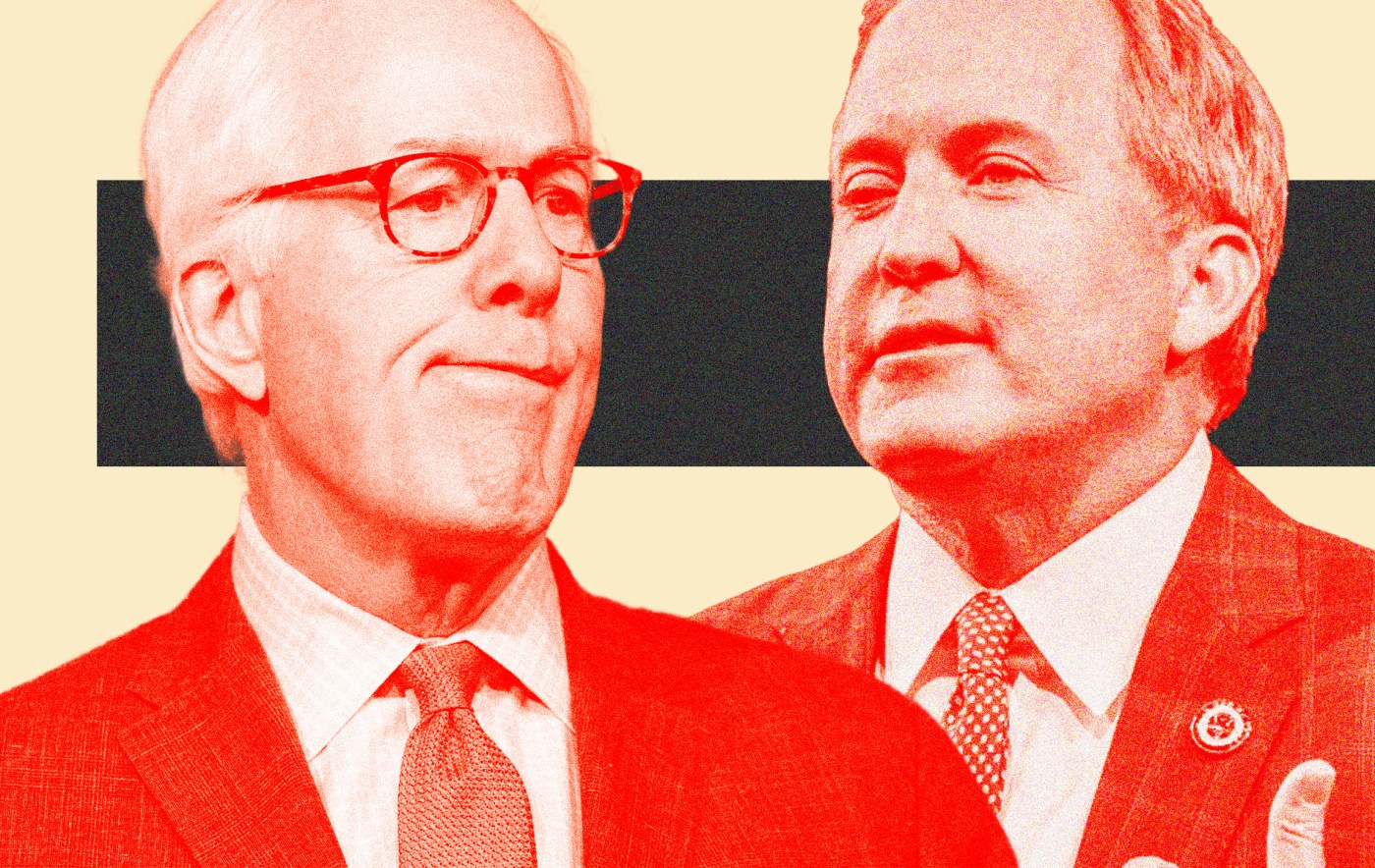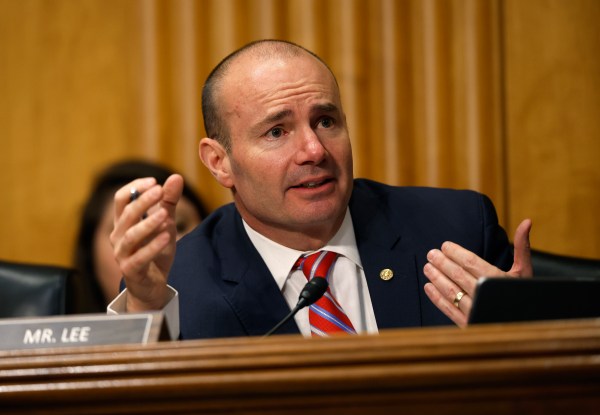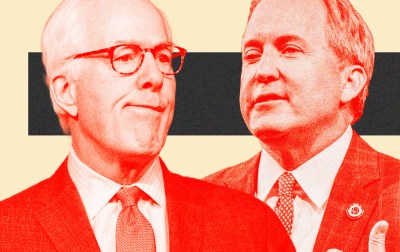Sen. John Cornyn is readying plans to blanket Texas with advertising detailing Ken Paxton’s scandal-ridden tenure as state attorney general, a bid to revive his flagging reelection prospects that will test whether personal and legal improprieties still matter to Republican primary voters.
Initial internal polling suggests Cornyn, 73, is in danger of losing renomination in 2026 to Paxton, a close ally of President Donald Trump and favorite of grassroots Republicans despite myriad alleged misdeeds that led the Texas House of Representatives to impeach him in 2023. But the fourth-term senator’s theory of the case, GOP sources tell The Dispatch, is that Republican primary voters are only vaguely aware of Paxton’s ethical baggage and will reject the third-term Texas attorney general once educated by tens of millions of dollars in advertising.
If Cornyn’s strategy fails, it won’t be for a lack of resources, crucial in Texas because of its 20 media markets. The senator is a prolific fundraiser expected to raise all the money he needs to get his message to Republican voters in advance of the primary next March. The effort will be fueled by both his campaign and an aligned super PAC not yet unveiled. (During the first quarter of this year, Cornyn raised $2.5 million, closing the period with $5.7 million in the bank, Punchbowl News reported.)
“Ken Paxton is an EPIC fraud,” began a recent appeal for campaign cash the Cornyn campaign emailed to supporters. In this instance, Cornyn is accusing Paxton, 62, of soft-pedaling an investigation into the planned construction of a commercial, cultural, and housing development north of Dallas—known as EPIC City after the East Plano Islamic Center, a mosque spearheading the development—because the project has retained the same lawyer who represented him during the impeachment proceedings. Expect more of the same from Team Cornyn on a range of issues related to Paxton’s leadership and behavior in the state attorney general’s office.
The Cornyn campaign declined to comment.
The Paxton campaign also declined to comment. But a Republican operative close to the Texas attorney general predicted the senator’s strategy would fall flat. “They’ve heard it all already but they just don’t care—or they don’t believe it,” this source told The Dispatch, requesting anonymity to discuss the Paxton campaign’s view of the race. To counter Cornyn and tout his credentials as a fighter, crucial for any candidate in any Republican primary, Paxton is likely to highlight the dozens of lawsuits he filed against Joe Biden’s administration during the former president’s single term.
In an earlier era, before Trump assumed command and control of the Republican Party, the allegations against Paxton would have rendered him unacceptable to Republican primary voters. Among the 20 articles of impeachment filed against the state attorney general, on which he was later acquitted by the Texas Senate, were charges of bribery; making false statements; conspiracy; and misappropriation of public resources, including to conceal an adulterous affair.
But Paxton emerged from impeachment politically unscathed. Indeed, the attorney general’s standing with the sort of committed Republican voter who reliably participates in primaries may have even improved.
That’s due in part to how grassroots Republicans have come to regard allegations of unethical behavior in the Trump era. Rather than believe the charges, GOP voters tend to suspect a political conspiracy—manufactured by the Democrats, the media, legal authorities, or some combination of the three. That sentiment on the right has become so pervasive that many GOP voters assume that morally compromised Republican politicians are being targeted for the “crime” of fighting the so-called establishment on their behalf.
Trump’s history of questionable behavior personally, legally, politically, and in business; the multiple criminal and civil investigations he’s faced; and his two impeachments and acquittals have certainly helped alter what Republican voters are willing to accept from their elected leaders.
All of which leaves Cornyn facing perhaps the toughest Senate campaign—general election or primary—of his career. That career has included stints as Texas attorney general and state supreme court justice; two tours of duty as chairman of the National Republican Senatorial Committee; and six years as the whip, the No. 2 official in the party’s leadership pecking order. In November, with Republicans having won the Senate, Cornyn ran for majority leader but was defeated by Sen. John Thune of South Dakota.
“The numbers don’t seem to be there for Sen. Cornyn to beat Ken Paxton in the Republican primary or runoff,” said Jeff Burton, a Republican strategist who lived in Texas for a time and has campaign experience in the state. “A lot can change over the next few months, but his challenge is as real as can be and it is definitely going to be the toughest battle Sen. Cornyn has had.”
The wild card is Trump.
Under normal circumstances, the president would be expected to endorse Paxton, a vocal Trump loyalist since the summer of 2016. In late 2020, the attorney general backed Trump’s claims that his loss to Joe Biden that November was illegitimate, suing in federal court to block the Democrat from taking office as the 46th president (the U.S. Supreme Court rejected the case.) Meanwhile, Cornyn occasionally criticized Trump during his first term and did not rush to endorse him for president in the GOP presidential nomination in 2024.
But this Republican primary is not a simple case of the pro-Trump challenger taking on the unabashed anti-Trump incumbent.
The two-term senator over the years has been supportive of Trump initiatives in Congress. And as Cornyn neared his reelection announcement—and since—he has emphasized these agreements and his general appreciation for the president. On the flip side, Cornyn doesn’t just need Trump; the president needs the senator, at least for now. Republicans control thin majorities in Congress, and Trump is fixated on passage of a reconciliation package of tax and spending cuts that is exempt from a Democratic filibuster but will need at least 50 of the 53 available GOP votes to clear the Senate—and that’s with Vice President J.D. Vance as the tie-breaker.
That makes Cornyn’s single vote on the Senate floor rather valuable to the president, possibly discouraging him from endorsing Paxton.
For now, at least, Trump is playing coy, telling reporters over the weekend that he’s undecided on whom to back but that he will endorse in the primary at some point. “The most important factor is the unknown of what [President] Trump is going to do,” said Brendan Steinhauser, a Republican operative in Texas who worked on Cornyn’s 2014 campaign.






Please note that we at The Dispatch hold ourselves, our work, and our commenters to a higher standard than other places on the internet. We welcome comments that foster genuine debate or discussion—including comments critical of us or our work—but responses that include ad hominem attacks on fellow Dispatch members or are intended to stoke fear and anger may be moderated.
With your membership, you only have the ability to comment on The Morning Dispatch articles. Consider upgrading to join the conversation everywhere.